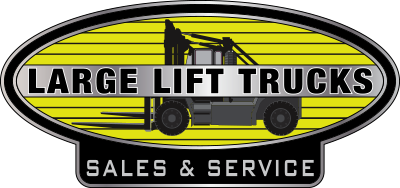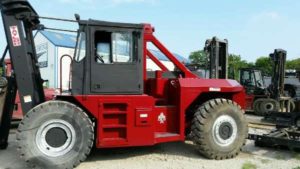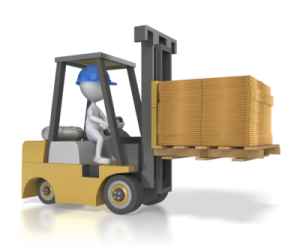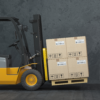5 Benefits of Automated Forklift Trucks

Introduction
Looking to optimize your warehouse operations?
Almost every truck manufacturer now offers automated forklift trucks. However, despite the availability of these trucks, most companies still feel that manually-operated diesel forklifts are the way to go.
The reason? Although automated forklifts can offer many advantages and savings, most warehouse operators feel they can have a high initial cost or are expensive. This is hardly true when you look at these devices’ long-term savings and efficiency.

As per data, the automated guided forklift market is growing and was estimated to be worth USD 1.42 billion in 2022, which can grow to USD 1.55 billion in 2023 and reach 2.01 billion by 2027.
So if you want to stay ahead of your competition, here are a few reasons why automated forklifts are the way forward for your business.
What is an Automated Forklift?
An automated forklift, categorized as a type of automated guided vehicle (AGV), is a cutting-edge material handling solution that utilizes advanced technologies to perform tasks without requiring direct human intervention. These self-driving forklifts have sensors, cameras, and navigation systems that enable them to navigate warehouse environments, detect obstacles, and execute material handling operations efficiently.

5 Key Benefits of Automated Forklift Trucks
Automated forklift trucks offer numerous benefits that revolutionize warehouse operations, making them a popular choice for buying or renting. Here are five key advantages of incorporating these advanced machines into your business:
Increased Productivity
The key benefit of using automated forklift trucks vs. manual forklifts is the added productivity and efficiency that you can gain. With automated forklift trucks, productivity levels soar as they can work around the clock without fatigue or breaks.
These machines optimize workflow, reduce downtime, and accelerate material handling tasks by eliminating human limitations, ultimately boosting overall productivity.
Enhanced Safety
Safety is a top priority in any warehouse environment, and automated forklift trucks excel. As per National Safety Council, forklifts were the cause of 70 work-related deaths and led to 7,290 nonfatal injuries. This was majorly due to improper training of resources and not following safety protocols. According to the Occupational Safety and Health Association’s (OSHA) findings, 70% of forklift accidents were preventable if proper safety training and stringent policy implementation were done.
Equipped with advanced sensors and collision avoidance systems, automated forklift trucks can navigate precisely, detecting obstacles and avoiding accidents. By reducing the risk of human error and collisions, these trucks help create a much safer working environment for employees and have been shown to significantly reduce the occurrences of accidents or errors.
Cost Savings
Automating repetitive tasks through forklift trucks significantly reduces labor costs associated with manual handling. By implementing automated solutions, companies can optimize their workforce and allocate resources efficiently to the tasks that require manual oversight. This efficient allocation and automation help to minimize expenses in the long run, leading to substantial cost savings.
Improved Accuracy
Automated forklift trucks excel in accuracy and precision regarding material handling. With their advanced sensors and mapping systems, they can precisely locate and position items, reducing the chances of errors or damage during transportation and stacking.
This level of accuracy translates into better inventory management and improved customer satisfaction.
Scalability and Flexibility
Businesses constantly face changing demands and fluctuating workloads. Automated forklift trucks offer scalability and flexibility to adapt to these evolving needs. They can be easily integrated with existing warehouse management systems and accommodate varying load sizes and types, ensuring seamless operations and efficient utilization of resources.
Thanks to their ability to help businesses scale effectively, AVGs are the largest and fastest-growing segment in the service robotics industry. The International Federation of Robotics 2022 Report findings forecast unit sales of over 700,000 vehicles by the end of 2023. Therefore, manual forklifts will continue but will start to be slowly replaced with more driverless and automated solutions.
Conclusion
In conclusion, implementing automated forklift trucks offers many benefits for warehouses and distribution centers. These self-driving machines significantly improve productivity, enhance safety, and optimize operations by harnessing advanced technologies.
With increased efficiency, improved accuracy, and potential cost savings, businesses can stay competitive in today’s fast-paced logistics landscape.
Ready to take your warehouse operations to the next level? Explore the range of automated forklift trucks at Large Lift Trucks and unlock the potential of automation in your business. Visit our page for more information.
Common Questions about Automated Forklift Trucks
What is an automated forklift truck?
An automated forklift truck, also known as an autonomous or self-driving forklift, is equipped with advanced technologies such as sensors, cameras, and navigation systems that help it work independently of human interference.
How do automated forklift trucks work?
Automated forklift trucks use a combination of technologies to navigate and perform tasks. They rely on sensors like LiDAR and cameras to detect their surroundings and avoid obstacles. They also utilize mapping and localization systems to determine their precise location within the facility.
Can automated forklift trucks completely replace human forklift operators?
While automated forklift trucks can perform many tasks independently, they do not necessarily replace human operators entirely. In some cases, human supervision may still be required, especially for complex operations or tasks that require manual dexterity.
Are automated forklift trucks suitable for all types of warehouses?
Automated forklift trucks are generally suitable for various warehouses and distribution centers. However, their suitability depends on factors such as the facility’s layout, the nature of the goods being handled, and the level of automation required.
Can automated forklift trucks be customized for specific warehouse requirements?
Yes, automated forklift trucks can be customized to meet specific warehouse requirements. They can be programmed to operate within defined zones, handle certain loads, or follow particular routes.
What are the maintenance requirements for automated forklift trucks?
Automated forklift trucks require regular maintenance, including software updates, sensor calibration, and preventive inspections. However, these are not too complex, and the cost of maintenance needs are generally comparable to traditional forklifts.
Are automated forklift trucks suitable for small-scale businesses?
Yes, automated forklift trucks can benefit small-scale businesses by improving efficiency, reducing labor costs, and optimizing space utilization.






